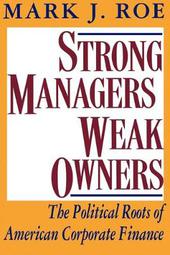
|
Strong Managers, Weak Owners: The Political Roots of American Corporate Finance
Paperback / softback
Main Details
| Title |
Strong Managers, Weak Owners: The Political Roots of American Corporate Finance
|
| Authors and Contributors |
By (author) Mark J. Roe
|
| Physical Properties |
| Format:Paperback / softback | | Pages:342 | | Dimensions(mm): Height 254,Width 197 |
|
| Category/Genre | Corporate finance |
|---|
| ISBN/Barcode |
9780691026312
|
| Classifications | Dewey:658.15 |
|---|
| Audience | | Professional & Vocational | | Tertiary Education (US: College) | |
|---|
|
Publishing Details |
| Publisher |
Princeton University Press
|
| Imprint |
Princeton University Press
|
| Publication Date |
24 March 1996 |
| Publication Country |
United States
|
Description
The distinctive character of corporate business enterprise in the United States - large firms guided by powerful, centralized managers, historically deferential directors, and distant shareholders - is usually thought to be the inevitable result of economic and technological forces. In this major reinterpretation of the origins and evolution of corporate structure, Mark Roe shows that the nature of the American corporation derives not only from these forces but also from political decisions that made alternative forms of organization costly or illegal. Drawing upon work in economics, history, law, and political science, Roe argues that the role of politicians in mediating the interaction between firms and financiers is a critical, but neglected, part of the explanation why certain forms rather than others prevailed. In their classic 1932 study, The Modern Corporation and Private Property, Adolf Berle and Gardiner Means argued that the separation of ownership and control was the consequence of industrial technologies requiring large-scale production, which in turn led to highly dispersed stockholding. Roe demonstrates, however, that the ownership structure of the American corporation represents just one of several possible outcomes, and that other organizational forms arose abroad (in Germany and Japan, for example) under the influence of different political conditions. At a number of critical junctures, political choices were made about how savings were to be channeled to industry that sharply restricted the power of financial institutions to shape the growth of large firms. These decisions, which pre-dated the New Deal, going as far back in some cases as the nineteenth century,reflected the American public's enduring dislike of concentrated financial power. Once these rules for the governance of financial institutions were in place - but not before - the Berle-Means corporation became inevitable. In recent years, new technological and competitive cha
Author Biography
Mark J. Roe is a professor at Columbia Law School.
Reviews"Economic theory appeared to predict that the American version [of capitalism, in which firms feed on a huge and liquid stockmarket] should be the most efficient. This view stemmed from [Berle and Means] in The Modern Corporation and Private Property ... held sway for the next fifty years... Roe ... takes this debate a giant step forward. Far from being the inevitable winner of a Darwinian struggle, argues Roe, the Berle-Means corporation owes its existence to American politics, and in particular to a deeply ingrained popular mistrust of concentrated financial power."--The Economist "Roe ... argues persuasively that old-fashioned politics ... play[s] the key role in building a structure of corporate finance... Strong Managers, Weak Owners does for corporate governance what Alfred Chandler's The Visible Hand did for the corporation: makes history essential to understanding current practice and policy."--Robert Teitelman, Institutional Investor
|